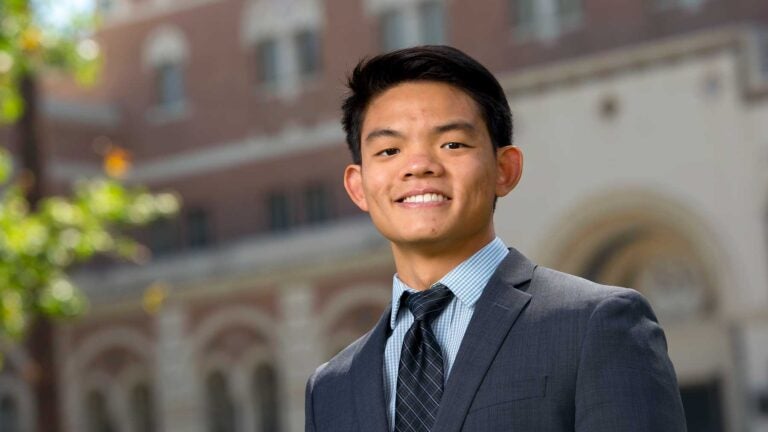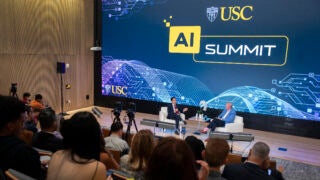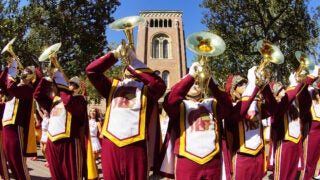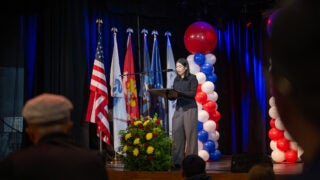
Salutatorian Jordan Kondo has studied abroad, assisted with research and studied East Asian languages and biology. (USC Photo/Gus Ruelas)
Salutatorian Jordan Kondo left his Hawaii home and hasn’t stopped traveling — or learning
He says USC’s interdisciplinary outlook and short-term international programs changed his entire career trajectory
This week, USC News profiles the Class of 2017’s salutatorians and valedictorian: today, salutatorian Jordan Kondo; Tuesday, salutatorian Amanda Semler; and Wednesday, valedictorian Cooper Nelson.
When salutatorian Jordan Kondo looks back at his four years at USC, it’s his time off-campus that actually sticks out the most.
When he set foot on campus his freshman year, he had never lived outside of his home of Honolulu.
“I always kind of considered myself a local island boy,” Kondo, 22, said, sitting at a table outside Popovich Hall in an aloha shirt. “Hard to believe a year later I was at Oxford learning about global health.”
The next year, as a sophomore, he went to Genoa, Italy, where he heard USC’s Valter Longo talk about his research on calorie restricting diets and their effects on longer and healthier lives.
In that moment, Kondo realized he was hooked on nutrition.
“I had always been interested in nutrition, going back to my days as a wrestler trying to cut weight,” he said. “When I learned how nutrition could be key to longevity, that was striking to me.”
In that talk, Longo had mentioned that a group of centenarians studied in a community in Okinawa, Japan. So Kondo went there last summer. He learned about their traditional diets and the value they place on social relationships.
“That’s not something a hard science … will capture,” he said. “Having those experiences were valuable.”
Change of course
Kondo, who will graduate majoring in human biology with a minor in East Asian languages and culture, said it’s typically hard for pre-med students to study abroad but USC made it possible with short-term programs like those he took, programs that changed the course of his studies.
The international experiences have broadened what I want to do with a career.
Jordan Kondo
“The international experiences have broadened what I want to do with a career … understanding pursuing something in the medical field can be far beyond the examination room,” he said.
It was also USC’s interdisciplinary approach that gave him confidence in taking an atypical pre-med path. He’s a regular at the USC Sidney Harman Academy for Polymathic Study within Doheny Library, where faculty and students discuss topics from a wide range of disciplines.
His background of both science and the humanities also made him interested in looking at science from different perspectives.
For example, he’s assisting research on Parkinson’s disease, examining the symptom of rigidity by studying a certain type of worm, called a C. elegans.
Side by side
Kondo is working alongside marine biologist Andrew Gracey and linguist Khalil Iskarous to look at how the worm’s movements change when certain genes are removed.
“Eliminate a protein and then it stops moving – then you know it’s critical for its movement,” Kondo said.
Why would a linguist be involved? Apparently, the worm moves in a hydrostatic motion, like a human tongue. By looking at the worm’s motion, it could give insight into how human movement is impacted by what doctors believe is a dopamine malfunction in the brain due to the disease.
“I think what’s really cool is I never thought about the biological phenomenon that is Parkinson’s disease from a linguistic perspective,” Kondo said.
When a paper is eventually published, Kondo’s name will be on it along with the other researchers.
And for all of this, Kondo didn’t have to worry about money. He’s a trustee scholar, given a full ride at USC, and the Gold’s Family funded his abroad studies. The provost supports his research work.
Even though he’s graduating, he still has his eye on academics. He found out he’s received a Fulbright Scholarship. He hopes to go back to Japan to study that centenarian population, looking at their key to longevity and how the younger generations are faring differently – a path he likely wouldn’t follow if it weren’t for USC.



